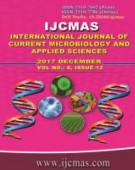


 National Academy of Agricultural Sciences (NAAS)
National Academy of Agricultural Sciences (NAAS)

|
PRINT ISSN : 2319-7692
Online ISSN : 2319-7706 Issues : 12 per year Publisher : Excellent Publishers Email : editorijcmas@gmail.com / submit@ijcmas.com Editor-in-chief: Dr.M.Prakash Index Copernicus ICV 2018: 95.39 NAAS RATING 2020: 5.38 |
Global biofuel production has tripled from 4.8 billion gallons to about 16 billion, concerns about energy security and soaring oil prices have driven policymakers and scientists to develop alternative energy sources. Currently, algae are considered as potential biomass feedstock sources for the production of advanced biofuels. Algae can be cultivated in unproductive lands and poor quality waters. Worldwide, the current research focus is mainly on identifying the algal strains with higher lipid content (i.e. above 40 per cent triglycerides in the biomass) and biomass productivity for mass cultivation. By growing lipid rich strains in large scale, the oil yield can be enhanced which can be converted into biodiesel and blended with petrodiesel to replace significant quantities of fossil fuels. Three microalgal samples Botryococcus sp., Chlorella sp. and Tetradesmus wisconsinensis were selected and screened for fast growth and high oil content. Also they are grown outdoors in either paddle-wheel mixed ponds or circular ponds with a rotating mixing arm. More recently, a helical tubular, cylindrical and airlift photobioreactor system, has been developed which allows these algae to be grown reliably outdoors at high cell densities in semi-continuous culture. The main problem facing the commercialisation of new microalgae is the need for closed culture systems and the fact that these are very capital intensive. Although this problem has been avoided in some instances by growing the algae heterotrophically, not all algae or algal products can be produced this way.
 |
 |
 |
 |
 |